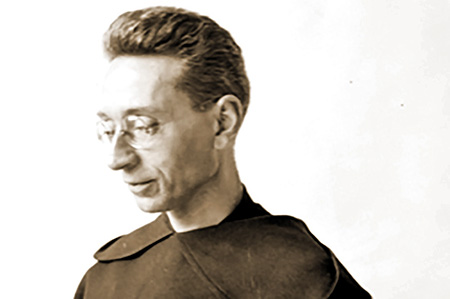Throughout his life, Fr Titus Brandsma was a man of forgiveness and reconciliation, including in the most complicated situations and contexts. When he was Assistant Press Officer of the Catholic Press, he had to face complex situations (political instability, tension, labor struggles, radicalization, etc.) and always demonstrated a willingness for dialogue, open to the ears of all. Through this, he earned the nickname “the reconciler.”
Similarly, during the year he held the position of Chancellor of the Catholic University of Nijmegen, Professor Brandsma tried to create an atmosphere of dialogue and always sought to find opportunities for encounter and understanding. It was not easy, since the Central European universities at the beginning of the 1930s found themselves in an atmosphere of extreme tension between radicalisms of various types (communists, fascists, nationalists, etc.).
Given this context, perhaps we can understand better his fondness for Esperanto, the artificial language created by Ludwig Zamenhof to avoid so much division (including violence) provoked by the not always easy coexistence of languages, and to fend off the linguistic colonialism that, in no few occasions, imposes itself.
Esperanto was for him – maybe in a somewhat romantic way – an instrument of understanding, a way of overcoming the linguistic barriers that, on occasion, turn into racial, supremacist, and discriminatory barriers.
Ecumenism
At the same time, from this point of view, the ecumenical attiude of Titus is understood in all its depth. Our Carmelite was a true pioneer of ecumenism in Carmel. He formed, with great enthusiasm, the so-called “Apostolate of Reunification”, oriented to the better knowledge and rapprochement of Catholics with the eastern churches. In addition, he always showed a very respectful attitude and was close to the Protestants (mostly in the Netherlands) and always pursued frank and fraternal dialogue with the separated brothers.
In the face of conflict
During the long months of imprisonment in various prisons and concentration camps, Fr Titus lived together with several Protestants, some of whom would later testify during the beatification process, emphasizing his generosity, kindness and deep trust in the Lord.
This does not mean to say that he was a “diplomat,” nor that he lacked strong ethical and religious principles; on the contrary. Indeed, after the Dutch invasion, on a few occasions, Professor Brandsma would show his firm opposition to some of the occupational government’s measures, including on the subject of education (when he refused to comply with the obligatory order expel to Jewish children) as on the theme of the press (when he told the directors of Catholic newspapers that they must refuse to publish Nazi slogans). However, despite his firm rejection of National Socialist ideology, he never showed any hatred toward the guards of the Lager for what they did to him. Moreover, our Carmelite invited the religious whom he met in Dachau to pray for them.
Deep down, he believed that yielding to hatred would be the true victory of evil.
Fr Titus never hated the Germans either as a people, as a nation. When the sergeant-at-law Hardegen asked him to write a small essay about the reasons why the Dutch, and especially Catholics, opposed National Socialism, the prisoner developed a brief composition in which he elaborated on the philosophical, ethical and religious motives (a theme about which he had spoken frequently in his university classes). Despite the head-on opposition, the text concluded with a beautiful blessing: God bless the Netherlands! God bless Germany! May God grant these two peoples to return to the path of peace and freedom, and to recognize His Glory for the good of these two nations that are so close.
Today
In a world like ours, full of divisions and conflicts, Fr Titus appears before our eyes as an example, as a witness that reconciliation and forgiveness are possible, despite the difficulties, and as a true martyr for those most authentic Christian values.

